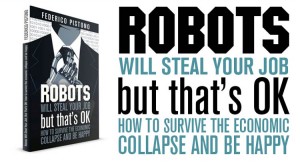Recently came across this on my Youtube feed. A pretty interesting Tedx talk on future of work, inequality and how a UBI (Universal Basic Income ), may actually work to solve some of today’s structure inequality issues.
The talk by Federico Pistono | Basic income and other ways to fix capitalism , gives us a really strong well thought out Ted talk about how our society is changing , and why considering things like UBI are necessary for a more uniform and equal society. see actual talk below (20 minutes).
My takeaways form this talk are the following:
- The talk starts out by framing the argument of basic income not as capitalism vs. socialism , rather than let economic fairly tales guide our way of thinking lets use data to ground our decisions. He rightly points out that no country in the word is truly one or the other rather, most countries blend attributes of both economic doctrines.
- Yes, we have massive inequality in the modern world, and it’s likely to get worse. A stat he notes was :
- The Top 85 people (NOT 85% or 85 mln) have more wealth than the bottom 3Billion people..
- and this inequality is becoming structural, ie. its not just temporary, and going away soon.
- Also echoing the mantra I’m always espousing , Yes, we’re screwed in terms of automation taking away jobs, Federico is in agreement with others that the near future will bring a huge change in the employment landscape.
-

Robots Will Steal Your Job, But That’s OK : Book
An interesting point in his talk is to counter all those folks that say we’ll have new jobs to replace the old ones, just like in the past. He dispels this by showing us , ranked by number of employees per job category, how many new jobs were created in the recent past, only computer programmers #38 on his list. That means all those jobs that are soon to be automated only a few are newer jobs, dispelling the idea that new jobs will create opportunities for large numbers. He has also written more on this topic, see his online book Robots will steal your job, but that’s ok.
- He goes on to point out any new future job will be highly specialized requiring great deal of knowledge (think very talented PHd google engineers) and there will be far fewer of those needed. Not everyone has the ability or capacity for that kind of work. Just like not all of us can run a 10s 100m dash, physical and intellectual talents are real limits.
- Federico then explains his points on Basic Income (or UBI) and cites some actual limited experiments and how surprising things happen when you just give folks with modest means a little bit of guaranteed money over a period of time. Spoiler: No they don’t just spend it on drugs and alcohol or gamble it away.
-

Federico Pistono
Finally Federico highlights some of the challenges of basic income, Who will pay for it? Does it accomplish the goal of reducing inequality? and one that I did not ever consider is that , if basic income is implemented, what’s preventing every business (or those folks that have pricing power) such as a landlord who controls rent costs, from not just not raising the rent because now everyone has a little more money, and this can be applied to any business or service that has pricing power.
Overall Federico hit all the points right on, clearly and eloquently explaining the challenges and possibilities or this radical concept. Personally I think we’l go through a bit of an unemployment and social upheaval before this idea takes firm hold , but based on the economic trends its all but inevitable, if we don’t we’ll wind up in a very dystopian world, and that is not a fun place to be.